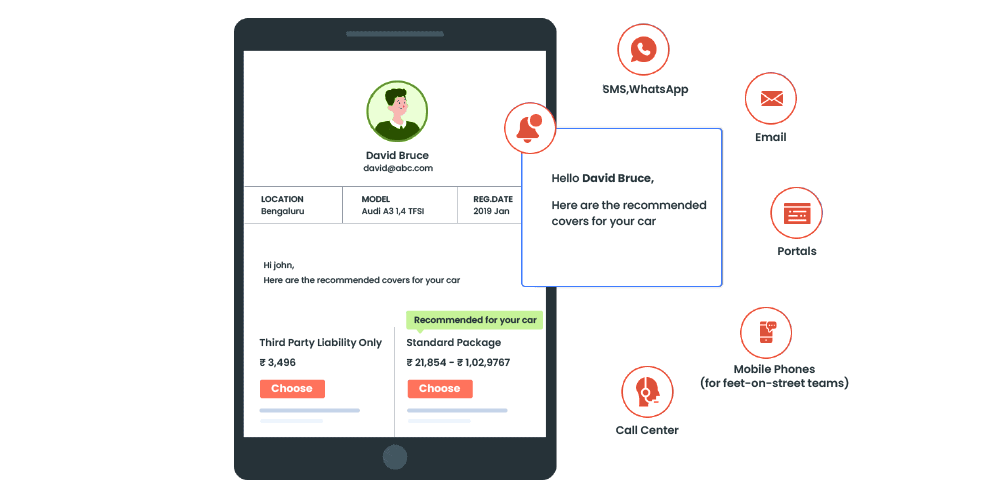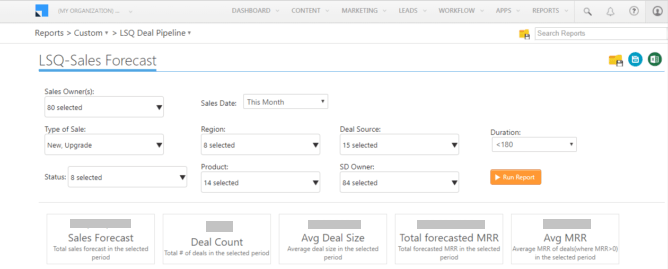- Home
- Learn
- Customer Experience
- The Importance of CRM in Increasing Customer Satisfaction
CUSTOMER EXPERIENCE
The Importance of CRM in Increasing Customer Satisfaction
Contents
Over the past few years, customer expectations in every business sector have increased exponentially. Almost all business sectors – from FMCG to automobiles, travel, and holidays, offer a plethora of choices to consumers. This trend has made customer service crucial to any business.
A CRM or Customer Relationship Management software helps you retain your old customers while also getting new ones. It enables you to keep the sales pipeline organized. The Importance of CRM software has increased over the last few years as research revealed that CRMs boost sales by up to 29%. It also allows businesses to forecast more accurately, improving sales by 42%.
When we want to purchase a service or a product from a brand, we engage with those that understand our needs better. You want to be offered solutions relevant to you, and you want the process to be easy and transparent. Now, this is where the importance of CRM in retailing and B2B increases.
The following are the ways in which CRM helps increase customer satisfaction.
An essential element in customer satisfaction is providing customers with high-quality experiences. The challenge lies in understanding that each customer has their own needs. Every customer will have an opinion about your products and services. Therefore, you must understand the customer personas and then cater to them accordingly.
By tracking all identity and behavioral data, CRM helps understand the customer better. You can then use this knowledge to improve your service and product.
A CRM platform can help you improve the communication experience of the customer. While more tech-savvy customers will contact the website via chat or email, many people will still feel comfortable talking over the phone. However, the prevailing pandemic has eliminated the option to visit the store or office. Therefore, people may also seek video calls. Younger customers may prefer to contact brands for queries and support over social media.
Sometimes customers may switch channels during the conversation. They can send an email initially and then continue over a phone call or instant messaging. According to HubSpot, 33% of customers get frustrated when they have to repeat why they are contacting support staff. So, having cross-channel communication and having a context of communication is crucial. It also shows the importance of CRM in binding multiple communication channels together for a seamless communication experience.

No customer likes to see ads for products and services they do not require. Therefore, brands must focus on targeted marketing. Conversion rates can improve by 8% when brands adopt a personalized approach.
This experience means providing relevant discounts to customers and sending only relevant newsletters and emails to customers.
There is no better way to personalize communication than using a CRM for understanding and segmenting customer records based on their preferences.
Customers often make further purchases based on their after-sales experience. Say you buy a bicycle. Months later, you contact the store to replace a worn-out cassette, only to find that they do not have it in stock.
Customers are more likely to purchase from brands that provide them with comprehensive after-sales support. Ideally, the store or the brand should keep in touch with the bike owner. They should ask if the customer is having any problems. Based on their response, the store should proactively ask the customer to get the bike serviced and stock up on spares.
Customer service is crucial in the B2C industry. Consumers do not change products very often and go with the brands they trust. With better customer service, you can also cross-sell and improve the CLV (customer lifetime value). That is why no business can deny the role of customer relationship management in today’s competitive world.
Imagine a customer saving up for a product only to find that your store or the brand no longer has it in stock. Not only is this frustrating, but it also creates a negative impression of the brands. Brands must learn to anticipate the needs of the customers better. For instance, they should investigate present market trends, social media posts, and more to know which products are in high demand.
Getting a product in stock can be challenging as the manufacturing process can be complicated and time-consuming. A notable example of this is the global chip shortage that started in 2020 and continues through 2021. The production issues because of the pandemic, a cryptocurrency boom, and the increased demand for computer parts to WFH have created a massive shortage. Manufacturers did not anticipate such a shortage. Now the price of pre-built computers and computer components has skyrocketed. Automobile production has stalled in various factories because of this shortage.
Okay, the pandemic was an exceptional case. However, with CRM, businesses can have better visibility into demands and can forecast sales accordingly. Maintaining a balance between demand and supply also directly impacts customer satisfaction and keeps the customer’s trust intact.
Customer satisfaction does not only depends on resolving their existing issues, but it also comes from preventing them from happening again.
Customers seek an immediate response from the support team, even if they cannot resolve the issue right then and there. The customer also expects brands to take feedback from support calls and make sure that the same problem does not happen again in the future.

A CRM platform is a centerpiece for the success of any modern business. In 2019, CRM software usage increased from 56% to 74%. Now, for customer satisfaction, CRM is indispensable. Marketing and sales teams heavily rely on CRMs to improve customer service and experience. Having contextual data on customers allow businesses to cater to their needs much better. It also improves the client’s experience with your business.
With the customer data, the marketing teams can target their campaigns and promotions to the right audience. They can automatically send emails to specific consumer segments or individuals when needed. It reduces cart abandonment and improves sales. CRM can also help with improving customer support. 74% of businesses using CRM have improved relationships with their customers.
Here are a few ways in which brands can use CRM software to improve their customer experience:
Most brands mostly focus on generating leads and getting new clients. However, research has shown that it is more profitable to keep old clients instead of getting new ones. Your old customers will bring new customers as social proof is a powerful tool.
CRMs improve customer satisfaction by allowing businesses to reach out to old customers. You cannot build a long-lasting relationship if you do not communicate. Clients will reach out to you if there is something wrong, but you too should reach out to them to know if everything is alright. You can offer them personalized discounts, inform them about product launches, or just wish them on their birthdays.
It will show that you, as a brand, care. Your CRM platform will already have all the data and tools needed to implement personalized communications.
Your business must function like a well-oiled machine to be effective and efficient. A collaborative CRM improves communication between departments. So, when the customer support forwards the call to the engineering department, they will also be aware of the conversation the customer had before. Other than this, CRM also allows sales, marketing, customer service, and technical teams to work together.
The importance of CRM lies in providing a holistic view of the business operations. It gives managers and the sales team clarity on the pipeline. Sales team members can prioritize leads or easily pick them off from their last conversation. It will show customers that the brand truly values them.
Visualizing pipelines can also help you set up conversion rate benchmarks. You can quickly deal with any bottlenecks that arise.

62% of customers are likely to open a marketing email when there is a personalized subject line. Your CRM software can gather data from multiple sources about a client. Sending out personalized communications will entice customers to respond and build a consistent and positive relationship with your company.
CRMs can also help with keeping the communication with your customers consistent. Nobody likes to be bombarded with marketing emails and then have no communication from the brand for months. A CRM can send out personalized emails promptly as per your set schedule.
Watch this webinar to understand how CRM can transform the customer experience (in the healthcare sector, for example).
CRM platforms help consolidate all your business data in one place. It may include customer contact, activities, communication data, and data regarding sales, leads, and conversion rates. Some CRM tools can integrate with ERP systems and even manage product inventory data.
Having all customer data under one roof makes it easy for sales and marketing teams to understand customer requirements and forecast sales.
Your CRM platform will actively analyze and store customer data. It will collect data about what customers are purchasing, what products they are browsing, or what they are talking about on social media. This information will help you optimize your business operations to cater to your customers better.
When it comes to service requests, Over 65% of consumers use social media. They will contact the brand via their Facebook, Instagram, or WhatsApp accounts. Your CRM system will collect and log all the service requests – no matter what platform they chose to communicate. If you keep up with your customer’s queries on social media, it will create a positive brand image.
Also read: 7 benefits of CRM to help your business grow.
Marketing and sales teams can benefit immensely from CRM solutions. Not only do they improve customer satisfaction, but they also make work easier for the business.
For instance, the marketing team will understand the target audience better, and the sales team will have more clarity on customer requirements. The support staff can effortlessly resolve issues – knowing the communication history. Managers will also get an overview of how the business is running and deal with bottlenecks quickly. Therefore, for both efficient business operations and customer satisfaction, CRM platforms are indispensable.
If you’re looking for CRM software to run high-velocity sales, LeadSquared is the way to go.